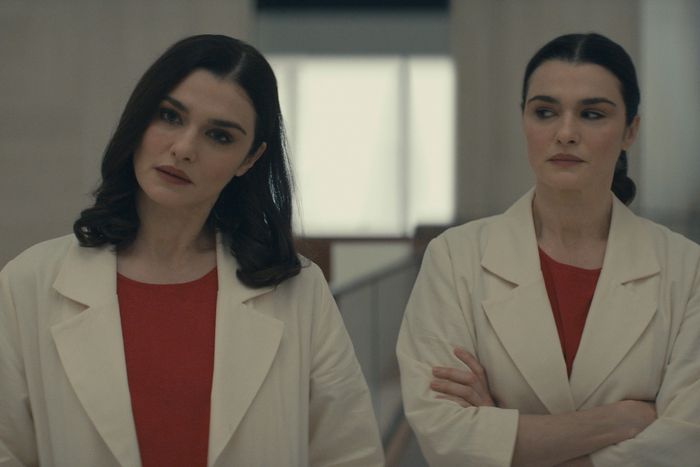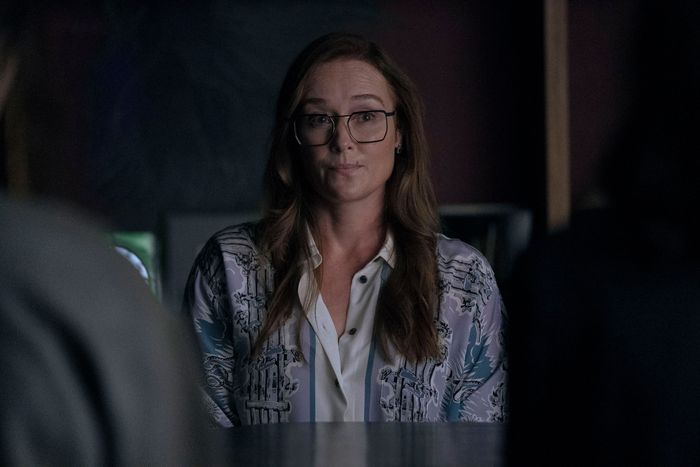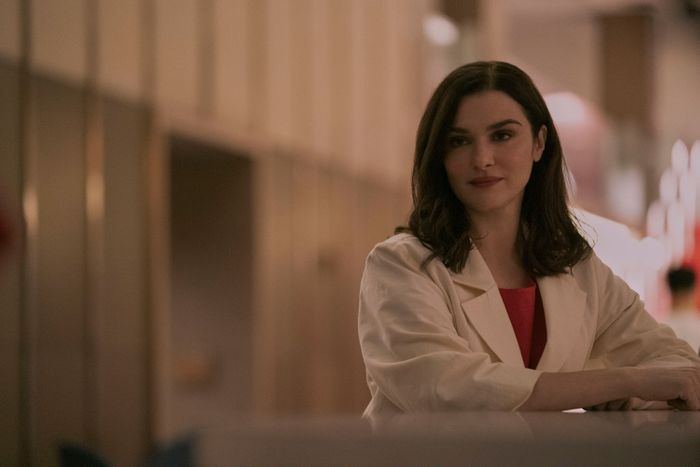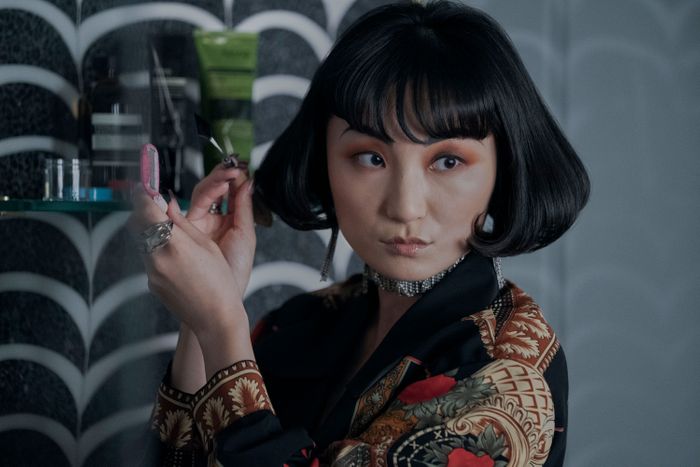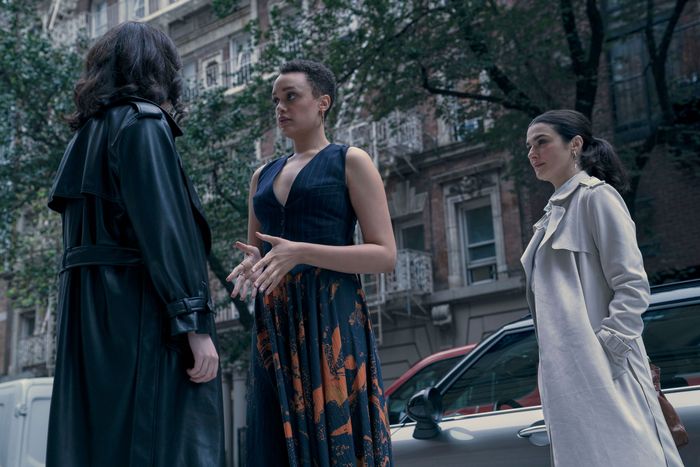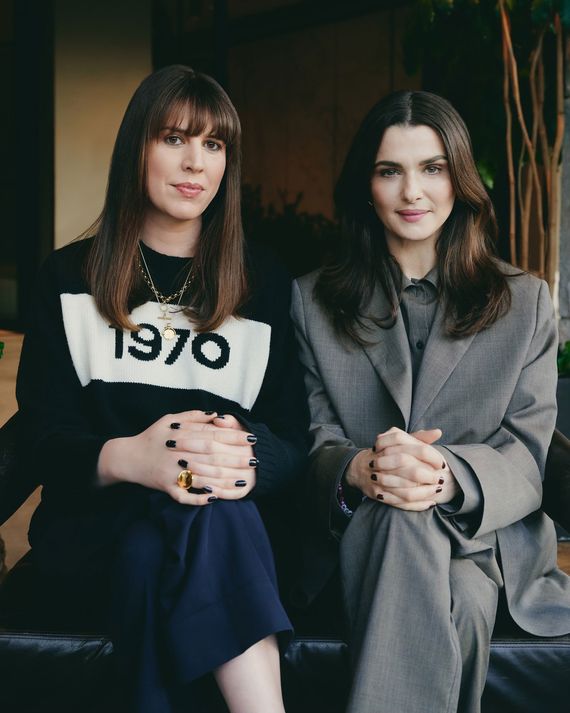
This conversation contains a specific, detailed discussion of Dead Ringers, including the finale, and all kinds of spoilers.
Dead Ringers, starring Rachel Weisz and Rachel Weisz as an identical pair of mad-scientist gynecologists, has an appropriately clonal origin story: The series is an adaption of David Cronenberg’s Jeremy Irons–starring 1988 film of the same name, which is an adaption of the 1977 novel Twins, which is itself an adaptation of the New York Magazine story about real-life twins Stewart and Cyril Marcus, esteemed New York doctors who died in 1975 around the same time, in the same apartment, and under very mysterious circumstances. In other words, it’s twins all the way down. And the series does go all the way down, deep into the lives and minds of Elliot and Beverly Mantle, dangerously codependent sisters who are as brilliant and talented as they are batshit insane and ethics-bending. Over the course of six twisted, darkly funny, thought-provoking episodes, the two engage in a toxic pas de deux, swapping and seducing each other’s patients, pushing the moral boundaries of medicine, and blurring the lines between their identities.
The whole thing sprung from a daydream Weisz had in early 2020. “I was a fanboy — as Poppy Liu, who plays the twins’ housekeeper, Greta, calls herself — of the film ever since it first came out,” Weisz told me over coffee at a hotel near the Brooklyn Bridge, where I met with her and showrunner Alice Birch a few weeks before the series’ April 21 premiere on Amazon. “And more recently I thought, Oh … what if?” Weisz brought the idea to Annapurna, then to Birch, a playwright and screenwriter who’d previously written on shows like Normal People and Succession; both were as obsessed with the idea as she was. Ultimately, Weisz ended up having at least four roles on Dead Ringers: as the show’s star(s), part of the writers’ room, and an executive producer.
Sitting across from me at the hotel framed by the Manhattan skyline behind her, Weisz looked more Beverly than Elliot, with a red kerchief tied around her neck, a button-down beneath a sweater, and her hair tied back. Throughout our conversation, she and Birch completed each other’s thoughts Mantle twins–style, often turning to each other mid-sentence to go on chatty tangents about everything from Russian novellas to their experiences giving birth in the U.S. and the U.K. Over the course of 90 minutes, the three of us talked at length about the show’s genesis, its many plot convolutions, its sex and birthing scenes, its queer overtones, and its shocking finale.
What prompted you to remake Dead Ringers?
Rachel Weisz: I’m often just kicking about daydream ideas. I was thinking about material that I could produce and develop, and it was a mixture of seeing the Dead Ringers film and seeing the lady gynos and obstetricians and midwives in my life. When I was younger, gynecologists were men, and they’re now women. I mentioned this to Sue Naegle at Annapurna. Sometimes you just say things to people who can make things happen and they look back at you blankly. But she liked it. And then I asked Alice if she was interested.
Did you already know one another? What made you reach out to Alice specifically?
RW: There was a play she’d written that I was obsessed with: Revolt. She Said. Revolt, which is very unusual. And I’d seen Lady Macbeth, in which she’d written an incredible performance for Florence Pugh. It was quite a stake in the sand for a young writer to write a girl with that kind of appetite and lack of apology and drive. I found it really startling.
What was that first conversation like? What ideas did you toss around right away?
Alice Birch: The two things that I really remember discussing are that the twins in the Cronenberg — until they’re having a terrible time — are having a lot of fun. Somebody’s always got a martini glass. It’s glamorous, it’s relaxing. I thought, That’d be really fun to write and imagine that.
And we talked about doctors. I’d heard a doctor on some kind of news program talk about the moment they decide, when performing a C-section, when life begins. That seemed like an extraordinary thing for somebody to say, even though it’s true. So I thought, Maybe these two women have some sort of godlike powers.
But I hadn’t seen the film until right before we spoke. And I thought the film was wild, frightening, and mad. I thought, I don’t understand this at all.
What was it that struck you about the film, Rachel?
RW: The psychological complexity. Mess. Toxicity. Delight. It’s such a fertile zone for drama. Jeremy Irons is phenomenal. But Geneviève Bujold! There’s something about how she plays Claire Niveau, the woman who the twins swap between them, and the way she owns her own damage. I’ve rarely seen a woman on film just say, “Yeah, I’m a complete mess. Here I am.” She’s so knowing, so intelligent about her dysfunction. That’s why we called Britne Oldford’s character Genevieve, as an homage.
Why do you think this story has been told so many times, in so many different mediums? What is it about these twins?
RW: Identical twins in general — there’s something uncanny and fascinating there. Everybody is drawn to them. And the story is heightened in the Cronenberg film, but they really were the Upper East Side doctors to deliver your baby if you were a certain type of wealthy woman. They were fashionable.
We actually met a woman who had been delivered by the real twins. At the apartment where the Mantles live in the show, where we shot the exterior and the lobby, I just started talking to the woman who managed the building, and she told me, “I was delivered by those guys.”
So much of what happens gynecology-wise on the show seems like sci-fi but is surprisingly possible. I found myself Googling things like, “Can you really implant ovarian tissue into premenopausal women to prolong the onset of menopause?” And it seems like maybe you can. What kinds of real-world research did you do?
AB: We spoke to obstetricians, midwives, embryologists, endocrinologists, scientists who work in the longevity field. We did so much research. In the writers’ room, every day someone would come in and be like, “Female sperm! Someone is trying to develop female sperm!”
RW: Yes. From cells from the female body.
AB: It’s so far away. But that it’s even being imagined and discussed by scientists, that was so exciting. We asked one scientist who came to speak with us, “If you had all the money in the world, what would you like?” And they said, ”Bodies. People to experiment on.”
What were some of the most shocking things, in that sense, that you stumbled upon in that research?
AB: Lambs in bags.
RW: Lambs in bags!
AB: That’s very advanced neonatal medicine. And talking to the longevity scientist was wild — the idea that death is preventable, that there are age-related diseases we can be treating in order to sustain life way beyond how we currently think about it.
RW: Can you gene-edit a living person’s genes? I can’t remember how you do that. I’m not a scientist.
AB: And then we’ve all read it — that the maternal mortality rates are so high. That’s still shocking. Every time we’d read about a story, or a midwife or a doctor would tell us that it’s still so dangerous to have babies, that continued to be shocking.
Rachel, your physicality as a doctor is so convincing — I’m thinking about the scene in which you turn the baby over while it’s inside the patient’s womb. How did you create that illusion?
RW: We had a midwife and an obstetrician always on the set to say, “Oh, no, you wouldn’t do that.” And prior to filming, I shadowed two obstetricians and observed a number of births.
Had you ever seen anyone give birth before that?
RW: No. It’s exhilarating. I got very hot, very adrenalized from it. Even though a baby is born every second — or maybe 40 per second? You can look that up, but it’s an incredible amount — when you actually see it, it feels like a miracle. You can’t believe that a human is coming out of somebody’s body.
How did your own experiences giving birth inform the writing of the show?
RW: My first birth was with a midwife, and my second was with OBs who had the souls of midwives. When I gave birth to my son in the U.S., it was in a birthing center attached to a hospital. There were three rooms, with bathtubs and no medical equipment, and when I went into labor, I got the last room. A woman came after me and had to use the waiting room, because she didn’t want to go to a hospital. There isn’t a lot of choice if you don’t want to go a medical route in the U.S. It’s very different in England when you give birth. It’s more the midwives who attend the births, and the obstetricians are there in case something goes wrong. It’s less medicalized.
AB: For both my children, I only saw midwives in the U.K., until the birth, when the doctor showed up. The second, I saw just a midwife and gave birth at home. But that’s not to say there aren’t issues within the U.K. It’s about having a system that’s able to be responsive to each woman’s different needs, and quickly. Obviously, in the States, it’s all so tied up in insurance and anxiety about things going wrong.
Will it take the radicality of doctors like the Mantles — people willing to do things outside of the realm of legality and ethics — to change the way that women give birth?
AB: I think we’re still asking ourselves these exact questions, and we don’t have the answers. I don’t know if the twins go down the route that I think is right. Beverly is very compromised by taking money from the Parkers. But in terms of dramatic potential, it’s either taking the money from the most evil people in the world or smashing shit up, and the former feels more interesting. But there are people in the States who are making changes in small, powerful ways.
RW: We did meet two obstetricians who have dreams of opening a birthing center in Manhattan. And they’re not political agitators; they’re just brilliant doctors. So I think there are plans afoot in the city for some change. It would be lovely if one could dream up what would be the most comfortable setting to give birth in.
I was fascinated by the overall conversation the show has around menopause. Beverly is pushing to change the language, the social norms around it. Elliot wants to implant the ovarian tissue and stop it completely. Where do either of you fall on that spectrum?
RW: I think it’s a personal choice for women. Elliot’s science is not yet available, but choice is always good.
AB: The world is probably closer to Elliot’s opinion. And feminism is increasingly about women and choice. But that often comes at the cost of other women who are nowhere near that choice. There’s a trickle-down effect that does harm, probably. But we’re all complicit. So that’s said without judgment.
RW: Did you follow the beauty of that line of thought? There are women who won’t have access to that.
AB: That’s the joy of writing this show. My brain works in those loops. It runs toward: Delicious drugs, giving me the skin and the sex drive of a woman in her 20s; why shouldn’t we have that, men get to have that! But then it goes, Hold on. Come back and reassess.
There’s also the meta layer of you examining this within an industry that is historically full of people who are much more on the side of Elliot, pressuring women to look eternally young. Having been in that industry for so long, how have your feelings and experiences in that sense evolved?
RW: I do think things are changing from when I was in my 20s. There are roles for women in all of their different decades now. There is, of course, still an aesthetic pressure on people to stay slim and young. I don’t have anything particularly original to say on the topic, but I do think it’s getting better.
AB: I don’t know. It’s hard to assess. It still feels like the same white dudes are in charge. In some ways it’s improved, but it’s so complicated. It’s such a system and an industry where you’re conscious that for many people, it doesn’t feel better. And it still feels like it’s remarked upon that we talk about “women’s stories” — that that’s the frame.
RW: It’s like, “What about pandas’ stories? Giraffes’ stories?” It makes you feel excluded from the storytelling culture, which you’re not.
Rachel, you’re arguably playing the juiciest roles of your career at this point in your life.
RW: Oh, yes. For me, it goes without saying. For me, personally, these are the best roles I’ve ever had in my career, with Dead Ringers.
You’ve also said that this was the most challenging job of your entire career. There are very obvious reasons why — there are two of you.
RW: In many scenes, yes, it’s really obvious — I’m playing both characters, each of whom loves each other deeply. Switching from one to the other got less and less challenging, but even if I had just been one character — just Elliot or just Beverly — it still would have been challenging and complicated. Because they go through so many things over the course of a day.
AB: I think creatively, that must be bananas. And technically, in really simple terms, we just don’t have time to do another take. In a twinning shot, we have to pick a “hero take.” Rachel will shoot Elliot on one side, and then we go through six, seven, eight takes, and the director and I and sometimes Rachel will choose one. And then she goes back and plays the other twin. She has an earpiece, and so do all of the other actors, and the second time around, they have to stay quite still. And we have an amazing actor who’s Rachel’s scene partner, who was there so she had somebody to work with.
RW: The whole crew had to shift between twins — an incredible group of technicians. We’d start with Elliot because she had more energy and would lead the pace, and Beverly would fit into Elliot’s energy, which seems psychologically right. And then everyone has to work as one: hair, makeup, lighting, set dressing, props, VFX. The sound department has to lay down the track, do exactly the right spaces between dialogue, take out Kitty — my acting partner’s — dialogue. There was so much work. The swaps became like a team sport.
And you were being paparazzied while you were filming, too.
RW: Oh, yes. On Fifth Avenue. With Kitty. You’ve just got to block it out.
There’s a quote in the show: “Do you ever lose yourself inside the characters you’re playing?” Did you feel that way?
RW: I’m thinking of Elliot saying, “The ACtress! The ACtress!” I do lose myself totally, between action and cut. It’s a great delight to get lost. Particularly with this kind of writing. But then at “cut!” I’m not lost. I come back.
You don’t ever take any of it home with you?
RW: Not now, no. When I started out, because I’m not trained, I had to make up my own technical way of doing it. So I used to think I had to stay in character. But for me, that wasn’t good for my acting or my life. It made both pretty bad. Also, I have a family. So I wouldn’t be able to function.
What were your touchstones for each character? Anything you did physically or mentally to get into the headspace of Elliot and then Beverly?
RW: Elliot is easily bored and always moving around. I’d often sing a song to myself to move around. Beverly is really still. She’s in touch with her interior life in a way that Elliot isn’t. Elliot is more free and Beverly is more tortured. But Elliot is exhausting.
What was all of the eating like, as Elliot? How much food did you actually consume?
RW: A lot. People would say, “Did you stay hungry to do the scene?” But I couldn’t, because we shot early and I get low blood sugar. I have to be well fueled. So it wasn’t like, “Oh, God.” I do think the burger scene in the diner, when we got to burger 15, I felt a little bit …
AB: But we never saw that. It was always Elliot, delighted to have a burger.
I want to talk about developing the show’s tone. It vacillates from very dark to very twisted to very funny to very moving, and it never really feels like whiplash. In the first episode, for example, you have a woman who gives birth to a stillborn baby, and then very shortly thereafter, Elliot is asking a patient’s husband to whip his dick out. That could easily fail tonally. What were the careful mechanics of making that work?
AB: That’s the kind of thing that I want to see: something that does everything to me as a viewer. We wanted these characters to be complicated and to be on the extreme. They are the most brilliant, the most successful women working in their field. So if you’re doing that, everything has to be running at a kind of rhythm, which is slightly frenetic. You feel it when you’re writing — the rhythm, the precision. If you make the scene where she’s asking the guy to show her his dick run on too long, or if you focus on the guy’s enjoyment, rather than it being about Elliot being so good at making this guy do what she wants.
Was there a scene that stuck out to you as particularly challenging, in terms of striking that balance?
AB: The scene with Agnes went through so many drafts. When we were shooting it, up until that point, Elliot had been having a lot of fun. Trying to meet an Elliot who wasn’t quite satisfied — it really felt like, “No, Elliot, you’re not having a nice time.”
RW: We’ve never actually discussed his, Alice and I. I was trying to disagree, as Elliot. I remember it vividly.
AB: You were. You were like, “I am having fun! I’m taking drugs on a rooftop. It’s lovely.”
RW: Karena Evans, who directed that episode so masterfully, was talking with Alice: “I don’t see it like this. I think things are changing for Elliot.” I was like, “I don’t think so!” I was trying to hold on. I was feeling what Elliot was feeling: She doesn’t know how to navigate dark things. She was taking drugs with someone who was getting into her headspace, and nobody gets into Eliot’s head. But Agnes really does. Karena kept saying, very gently, “I just don’t quite see it like this …” We did quite a few takes.
Jennifer Ehle, who plays Rebecca Parker, gets some of the most delicious dialogue in the show. Like when she says, “That all feels very vegetarian.”
RW: She’s so good. Rebecca is really a bad person, but you just want to be near her all the time. She’s so unapologetic about who she is and what she wants. It’s so refreshing to see a woman who has real power in the world. It’s such an overused phrase — “strong female characters.” I always think of, like, weight lifters or something. But she has immense power. She’s an oligarch. Through lobbying, she’s running the show, and we don’t even get to see any of that.
Usually men are in those positions. Who was the inspiration for that character and family?
AB: We talked about the Sacklers. The Tetra Pak family. Both me and Susan Stanton had written on Succession, so we talked about that family quite a bit.
I want to talk about the last episode, especially the Greta character arc — were we meant to understand at the end, when she tells the story about her mother’s death while giving birth, that the doctor she refers to is one of the Mantles?
AB: That’s so funny. Poppy said that last night. I hadn’t imagined that. But when we went to record that scene, it was originally a male doctor, and Poppy said, “Can we do some takes where it’s a woman?” That’s something I kind of want to lie and claim because it’s so beautiful, and it’s become part of the show, but that was not my intention.
And the final scene: In the original film, and in real life, both of the Mantles die. But you only kill Beverly, and Elliot assumes her identity. Why?
AB: We knew how it was going to end from really early on. It felt like it would be, having spent six hours with them, very nihilistic for both of them to die. And also, there’s four babies in the world!
RW: Someone asked me, “What about the babies?” They’re there. Elliot could have a preschool or day care down there in the lab.
That’s season two.
AB: It felt too tragic to kill them both. Plus, it’s the ultimate twin swap.
Why choose Elliot?
AB: It would have been too straightforward and happy of an ending — Beverly and Genevieve and their babies. Everything’s fine! Elliot is the person who has done more damage. I think people will have their own interpretations, but Beverly says she feels something close to happiness because she can go. She can’t bear it. That always felt right.
Do you think Elliot has fooled Genevieve at the end?
RW: What do you think?
I don’t think she’s actually fooled because she could always tell them apart, even when they swapped. But I think she wants to believe; she wants to be fooled.
AB: Yes.
RW: Yeah, that sounds right.
I love the ballsiness of how the show started by addressing the elephant in the room: Do the twins fuck each other? And cleverly calls out the viewer for even wondering.
AB: It felt important to claim it up front. The perception of twins is that they’re freaky, and maybe there’s something incestuous going on, specifically if it’s women. It’s such a male fantasy, and it felt good to have fun at Larry’s expense.
What was your internal belief about the twincest? Because it’s murky.
AB: I love that question. And I’d love to keep it murky. But you played them, Rachel, so …?
RW: Well, I don’t want to be a fantasy blocker. What was your feeling? I’m curious.
I wasn’t sure. There are a few moments, like when Elliot bites Beverly’s neck before she goes on her trip with Genevieve, that suggest maybe they do. And in the book, they explicitly do.
RW: With a woman, too?
No, just the two of them.
RW: I’d conveniently forgotten that! How does anyone know?
Well, we don’t know about the original real-life twins. Just the twins in the novel.
RW: Wow. I’d blocked that out.
We can keep it murky. It’s sort of the final taboo, and the show has such an interesting relationship with taboo. I don’t know that we’ve seen these things onscreen with regularity before: realistic, close-up vaginal shots of women giving birth; miscarriages; dramatic C-sections. Was there ever any pushback from Amazon or Annapurna?
AB: Honestly, no. It’s been in the scripts from the beginning. If they hadn’t been up for it, I think they wouldn’t have bought the show.
And I’m aware of what we’re doing. I want people to feel okay. But writing something and making something is often quite private and self-indulgent. It’s about what we were interested in, and I really wanted to see that onscreen. It looks the way it should, and it’s really authentic. Like Rachel said, it happens all the time; it’s how we all get here. We watch death and violence all the time, and I get it, but it’s interesting that this is considered “difficult to watch.” We talked about how it had to feel earned, but we didn’t worry about an audience wanting not to watch it.
The only other thing I can think of that goes that far is Knocked Up.
RW: I’ll never forget that scene in Knocked Up.
AB: And in This Is Gonna Hurt, on BBC, does do some of that, too.
I also love how the show is explicitly queer, and the fun visual framing around, for example, when Beverly meets Genevieve and she’s in stirrups on a table, and later in the episode, she’s going down on her in the same position on their kitchen table, after which Elliot crawls on top of it. What kinds of conversations did you have about the characters’ queerness and how far the sex scenes would go?
RW: We always knew the character that was going to come between them would be a woman, because it had to be a patient, and women go to gynecologists.
AB: And sex was always going to be a really important part of their characters from very early on — their relationship to sex and pleasure. And Beverly’s queerness became essential to who she was, very early on. Sean shot that first scene with Genevieve and Beverly, and we all wanted that to be so romantic and sexy and only about the two of them — she says, “I forgot I had a twin!” But then a couple of scenes later, Elliot crawls onto the table where they were just having sex. That was always part of it — when you’re alone with one of the twins, the other one is always lurking.
Rachel, you’ve played a lot of queer women over the past few years — Disobedience, The Favourite, now this. How much of that was deliberate versus coincidence? Is it something you think about when choosing or writing these roles?
RW: I think it’s a coincidence. I’ve played opposite many, many, many men in really interesting stories. I just hadn’t done this before until more recently. And it’s been … interesting.
AB: We never went, “Oh, well, now the twins are women, and that means this and that.” But of course it changes everything. In the same way that you, Rachel, were interested in finding stories about relationships between women, I’m interested in writing about women when men aren’t around. So a love story between two women that causes harm to another woman, that’s both natural and also, how interesting!
Right. I think there are like, two or three male characters on the show. Was that purposeful?
RW and AB: No!
AB: They just kept not showing up.
RW: There was never a mandate. We just wanted to do something neither of us had done before.
Rachel, how familiar are you with your queer female fan base?
RW: [Laughs.] I’m not really online or on social media. But Poppy Liu, who plays Greta, was telling me a bit last night. She was explaining terminologies.
Like what?
RW: I don’t remember all the words now. But she knows all the words of everything to do with queer culture and types of queerness. I’m a bit ignorant in this department, to be honest.
Can I show you something I think you will find amusing?
RW: Okay.
Are you familiar with the site Reductress?
RW: No.
It’s sort of a feminist Onion. Here’s a headline from a few years ago that I think sums it all up: “Woman Cozily Cupping Mug Secretly Thinking About Getting Absolutely Railed by Rachel Weisz.”
RW: [Studies the headline, looking amused but confused.] Oh, wow. What’s a “cupping mug”?
AB: Like, she’s sitting by the window, sipping her coffee, thinking about getting railed —
RW: [Triumphantly] Oh, it’s the picture! [Laughs loudly] Oh, that’s very funny. Railed!
It’s lovely to be in people’s dreams. Fantasy life is a beautiful thing, right? And everyone’s got one.



